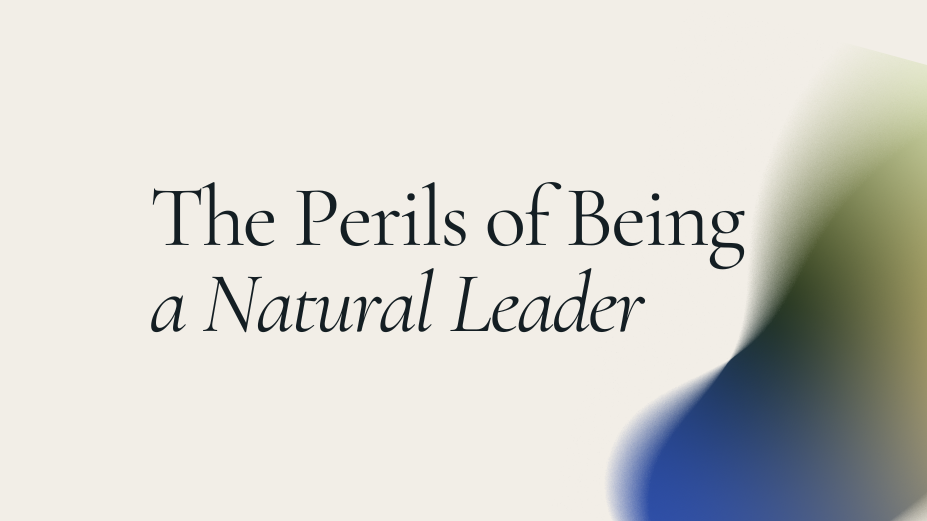Allyship and Emotional Intelligence
The strength it takes to stay open
.png)
“Emotional intelligence allows us to lead with resilience, adaptability, and empathy in moments of real pressure.”
Emotional intelligence is often framed as a totally “soft” quality, consisting solely of kindness, compassion, and approachability. But while those traits do matter, they’re not the whole picture – and there’s plenty they leave out.
Because in leadership, emotional intelligence (or EQ) is also present in harder moments: stepping into authority, tackling a difficult conversation, or being tough in service of a bigger goal. For many, those moments stretch them more than patience or care ever could. And they reveal a depth of emotional intelligence invisible when everything is easy.
In the right circumstances, toughness is empathy. And that broader definition matters when we turn to the subject of allyship.
A conversation that showed EQ in action
I saw this dynamic in an ISC event with Lacrecia Cade, CEO of the What-If Collective, and Pamela Thomson-Hall, Head of International at WTW. Our discussion focused on allyship in gender equity: why it matters, how it takes shape, and what gets in its way.
Both Lacrecia and Pamela are accomplished leaders – assertive, confident, and clear in their views. But in that conversation, what struck me most was not their certainty but their curiosity. They were willing to “not know” the answer to every question.
They listened intently to each other, to me, and to the audience. They actively sought to understand perspectives different from their own, and they were comfortable evolving their own thinking in response.
That ability to flex between strength and curiosity is a hallmark of EQ in leadership.
It shows up when leaders step into “the jeopardy of leadership” – meeting resistance without becoming defensive or dispirited, and staying present without tipping into anger or exhaustion. It’s the capacity to read the other person, adjust one’s style, and choose when to encourage and cajole, and when to challenge and be demanding.
The same demands on allies
If this balance is essential for leaders, it is just as important for allies. The parallel is straightforward: allyship, at its core, is an act of empathy – caring about the needs of others.
But genuine allyship goes further. It often involves stepping into situations where you don’t have the answers, where listening matters as much as advocacy, and where you may get the language wrong.
Those moments require both vulnerability and the resilience to remain engaged when that vulnerability is exposed. Without that resilience, allyship risks becoming symbolic rather than effective.
Why EQ matters beyond allyship
This is not just theory.
Over the last couple of decades, research has consistently shown that emotional intelligence is more important than either IQ or experience in predicting leadership success.
It’s easy to see why. Leadership is fundamentally about working with people – inspiring them, influencing them, supporting them, challenging them, and caring for them. EQ is the foundational capability that makes those actions possible.
And its impact extends far beyond the workplace. In my view, EQ is the single biggest factor in enabling us to live happy, contented lives, as well as in being effective leaders.
Consider one stark example: if Vladimir Putin had not been brutalised on the streets of Leningrad as a child – learning to meet a constant sense of threat with aggression – he might have developed greater empathy and less compulsive belligerence. The consequences for today’s world could be profound.
EQ can be developed
It’s important to say that EQ is not something we either have or do not have. The habitual patterns that shape our core responses to the world are often laid down in childhood.
These patterns can be hard to see, and harder still to change – but they are not fixed. Most of us need help to recognise them and to shift them when they no longer serve us.
Psychologist Daniel Goleman’s model begins with self-awareness. This is the starting point because without recognising our own ingrained patterns and hard-wired responses, we cannot choose a different course.
That recognition creates the possibility of choice. We can start to notice the moments when our instinctive reaction is unhelpful – and in those moments, we have the option to respond differently.
Awareness is the first step toward self-regulation. When we can see the impulse as it arises, we have a better chance of managing it – whether it’s a flash of irritation, a tendency to withdraw, or a habit of harsh self-criticism that chips away at our confidence.
Over time, this practice builds two qualities that are invaluable in leadership:
- Resilience: the ability to recover quickly from setbacks.
- Agility: the ability to adapt to what’s unfolding in the moment.
From self-awareness to leading others
Self-awareness also unlocks empathy. When we understand our own patterns, we can recognise similar patterns in others. And that recognition allows us to influence and help guide their behaviour – a cornerstone of leadership.
This is why leading change – whether in pursuit of gender equity, racial equity, or cultural change in an organisation – depends so heavily on developing EQ, both in ourselves and in those we involve in the effort.
With it, leaders and allies can navigate disagreement without disengaging, hold authority and openness at the same time, and sustain the relationships needed to see change through.
At Famn, this is the work we do every day: helping senior leaders and teams build the emotional intelligence to lead well when it counts most – under pressure, in transition, and in moments of real jeopardy. Our psychologically-grounded coaching goes beneath surface behaviours to unpick the deeper patterns that drive how people think, relate, and act. The result is leaders who not only know what good leadership looks like, but who can also embody it when it’s hardest.
SPEAKERS
“Emotional intelligence allows us to lead with resilience, adaptability, and empathy in moments of real pressure.”
Emotional intelligence is often framed as a totally “soft” quality, consisting solely of kindness, compassion, and approachability. But while those traits do matter, they’re not the whole picture – and there’s plenty they leave out.
Because in leadership, emotional intelligence (or EQ) is also present in harder moments: stepping into authority, tackling a difficult conversation, or being tough in service of a bigger goal. For many, those moments stretch them more than patience or care ever could. And they reveal a depth of emotional intelligence invisible when everything is easy.
In the right circumstances, toughness is empathy. And that broader definition matters when we turn to the subject of allyship.
A conversation that showed EQ in action
I saw this dynamic in an ISC event with Lacrecia Cade, CEO of the What-If Collective, and Pamela Thomson-Hall, Head of International at WTW. Our discussion focused on allyship in gender equity: why it matters, how it takes shape, and what gets in its way.
Both Lacrecia and Pamela are accomplished leaders – assertive, confident, and clear in their views. But in that conversation, what struck me most was not their certainty but their curiosity. They were willing to “not know” the answer to every question.
They listened intently to each other, to me, and to the audience. They actively sought to understand perspectives different from their own, and they were comfortable evolving their own thinking in response.
That ability to flex between strength and curiosity is a hallmark of EQ in leadership.
It shows up when leaders step into “the jeopardy of leadership” – meeting resistance without becoming defensive or dispirited, and staying present without tipping into anger or exhaustion. It’s the capacity to read the other person, adjust one’s style, and choose when to encourage and cajole, and when to challenge and be demanding.
The same demands on allies
If this balance is essential for leaders, it is just as important for allies. The parallel is straightforward: allyship, at its core, is an act of empathy – caring about the needs of others.
But genuine allyship goes further. It often involves stepping into situations where you don’t have the answers, where listening matters as much as advocacy, and where you may get the language wrong.
Those moments require both vulnerability and the resilience to remain engaged when that vulnerability is exposed. Without that resilience, allyship risks becoming symbolic rather than effective.
Why EQ matters beyond allyship
This is not just theory.
Over the last couple of decades, research has consistently shown that emotional intelligence is more important than either IQ or experience in predicting leadership success.
It’s easy to see why. Leadership is fundamentally about working with people – inspiring them, influencing them, supporting them, challenging them, and caring for them. EQ is the foundational capability that makes those actions possible.
And its impact extends far beyond the workplace. In my view, EQ is the single biggest factor in enabling us to live happy, contented lives, as well as in being effective leaders.
Consider one stark example: if Vladimir Putin had not been brutalised on the streets of Leningrad as a child – learning to meet a constant sense of threat with aggression – he might have developed greater empathy and less compulsive belligerence. The consequences for today’s world could be profound.
EQ can be developed
It’s important to say that EQ is not something we either have or do not have. The habitual patterns that shape our core responses to the world are often laid down in childhood.
These patterns can be hard to see, and harder still to change – but they are not fixed. Most of us need help to recognise them and to shift them when they no longer serve us.
Psychologist Daniel Goleman’s model begins with self-awareness. This is the starting point because without recognising our own ingrained patterns and hard-wired responses, we cannot choose a different course.
That recognition creates the possibility of choice. We can start to notice the moments when our instinctive reaction is unhelpful – and in those moments, we have the option to respond differently.
Awareness is the first step toward self-regulation. When we can see the impulse as it arises, we have a better chance of managing it – whether it’s a flash of irritation, a tendency to withdraw, or a habit of harsh self-criticism that chips away at our confidence.
Over time, this practice builds two qualities that are invaluable in leadership:
- Resilience: the ability to recover quickly from setbacks.
- Agility: the ability to adapt to what’s unfolding in the moment.
From self-awareness to leading others
Self-awareness also unlocks empathy. When we understand our own patterns, we can recognise similar patterns in others. And that recognition allows us to influence and help guide their behaviour – a cornerstone of leadership.
This is why leading change – whether in pursuit of gender equity, racial equity, or cultural change in an organisation – depends so heavily on developing EQ, both in ourselves and in those we involve in the effort.
With it, leaders and allies can navigate disagreement without disengaging, hold authority and openness at the same time, and sustain the relationships needed to see change through.
At Famn, this is the work we do every day: helping senior leaders and teams build the emotional intelligence to lead well when it counts most – under pressure, in transition, and in moments of real jeopardy. Our psychologically-grounded coaching goes beneath surface behaviours to unpick the deeper patterns that drive how people think, relate, and act. The result is leaders who not only know what good leadership looks like, but who can also embody it when it’s hardest.


.png)

.png)